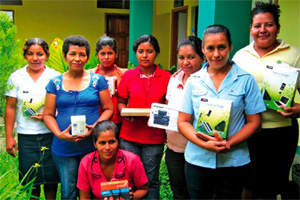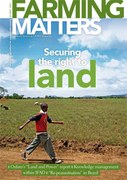Evidence suggests that foreign or private investments in land in Nicaragua have not occurred at the same rate as in other countries, but there are many competing claims to land. Coffee co-operatives have secured higher prices, helping vulnerable populations, but most co-operative members are men. Alternative approaches are helping those worst off: women farmers.

One hundred years later, the Sandinista government expropriated coffee plantations from elites and gave them to newly formed co-operatives. Since the 1990s, neoliberal economic policies have facilitated the buying and selling of land, while some of the land has merely been returned to its previous private and corporate owners. Successive governments have tried to encourage private and corporate property ownership, but have also aimed to achieve greater social justice by increasing the vulnerable populations’ access to land.
Meanwhile, fair trade co-operatives have secured higher prices for coffee, helping vulnerable populations to retain land ownership. But with changing policies and repeated periods of land reforms, it is not surprising that there are many competing claims to land.
According to Technoserve Nicaragua, an international economic development organisation, nearly 90 % of the coffee farmers in Nicaragua are small-scale producers. About half of those belong to co-operatives, according to the National Agriculture and Fishing Census.
Nicaragua has improved the process of land titling and documentation, one of the biggest threats to small landholders, but this has done little for landless farmers, especially women. An estimated 39 % of rural households do not own land.
Confronting the gender gap
Although Nicaraguan women work on every aspect of coffee production, they rarely own the land they work on or make decisions about its use. The Food and Agriculture Organization estimates that women own less than 2% of Nicaragua’s productive land, and scarcely 3% of women have titles to their land. Land reforms and the historical shift of communal land holdings to families situated land ownership and rights with men.
Despite legal reforms regarding marital property, cultural norms perpetuate the male head of household’s control over land. Land ownership has historically been a prerequisite to join agricultural co-operatives. This means that women are a minority in most Nicaraguan coffee co-operatives. Without land ownership, many women have not been eligible for government social programmes, some of which require beneficiaries to own between one and ten hectares of land.
The Central American office of the Fair Trade Labelling Organization, FLO, decided to partner with the local NGO Institute for Women and Community (IMC) to implement a thorough investigation of gender inequality and possible solutions in 20 of its partner coffee co-operatives. This research reported that, on average, 25% of all co-operative members are women, but their role as leaders and decision-makers ranks much lower – at around 15%. But the main issue arising from this three-year-long research is women’s overall lack of control over how household or co-operative resources are used, leaving them vulnerable or dependent upon a male partner. FLO and its partner co-operatives agree that the best solution to this problem is to implement strategic gender policies that aim to increase women’s membership and decision-making role within the co-ops.
Changing the co-operative culture
Co-operatives are a powerful force in Nicaragua. With a total of more than 3,500 registered co-operatives (and a 75% growth since 2006), Nicaragua has more of them than any other Central American country. Critics of the system contend that co-operatives are less productive than individual farmers. But smallscale farmers are attracted to them because they permit risk sharing and large-scale social and economic initiatives.
Many NGOs often prefer to work with these local partners that already have some organisational structure in place and can assume some of the responsibility of development projects. In addition, co-operatives can project a unified image or mandate, such as a focus on sustainable and organic farming – a requirement for FLO certification.
According to Nicaragua’s Co-operative Law 499, passed in 2005, co-operatives should have democratic values and structures. Law 499 defines a co-operative as a democratically run and jointly owned business, formed by persons united towards common economic, social and cultural needs and goals. Yet, as FLO’s research showed, “when we looked at the situation it was apparent that those at the top were men.”
This disparity is increasingly recognised by women farmers. Like many women who grow coffee, Trinidad Alfaro points to the fact that only her husband belongs to the co-operative because he is the legal owner of their land. But, “as I spend 5 months every year working my family’s coffee farm, I would love to join the coffee co-op and also have a say.” Alfaro is especially interested in the benefits members get, “like small loans to help us through the lean months before the next harvest.”
Other tangible benefits include technical training, and collective input purchases at wholesale prices. The type of support and resources often depend upon the cooperative. Some offer educational scholarships or programmes for members’ children; others provide loans to purchase seeds or fertilizers. Many want to provide quality assurance of their products, and thus focus on developing infrastructure for agricultural processing. Alfaro’s family can’t afford to purchase more land in her name. But she now has an opportunity to join her husband’s co-operative thanks to the ingenuity of the Institute of Development, Evaluation, Assistance and Solutions (IDEAS), an international non-profit organisation that has worked in Nicaragua for over 25 years.
A new approach to increase women’s membership
To increase female membership, co-operatives have three options: they can help women to buy land; encourage parents to will land to daughters; or create new paths to membership. The first two options are pretty straightforward solutions. PRODECOOP, a coffeeexporting group of 39 local co-operatives in northern Nicaragua, is getting creative with the third.
Zayda Treminio, the head of PRODECOOP’s Gender Department, regularly keeps her eye out for new initiatives. In 2011, IDEAS approached her team, interested in training women to become “microfranchisees” who would sell solar energy products. Treminio had never heard of a “microfranchising” system, but she knew a good opportunity when she saw one, and invited IDEAS to present the project to PRODECOOP’s Gender Assembly. Microfranchise is a new economic development tool that provides support systems to entrepreneurs, helping them set up and develop their nascent businesses. The representative from CCAJ, one of the co-operatives, insisted on hosting the first group of female sellers, or microfranchisees.
The idea appealed to PRODECOOP and CCAJ because it tackles several issues at once: it rewards participants with an economic opportunity and public affirmation of the hard work and leadership skills demonstrated by the co-ops’ Gender Assembly. The project is also an endorsement of clean, renewable energy. The co-operatives and IDEAS saw that solar-powered lanterns and radios can improve communities’ basic standard of living, as well as helping them to produce more efficiently by saving on the cost of energy inputs like kerosene.
Most importantly for women like Trinidad Alfaro, “being a microfranchisee opens the door for me to join the co-operative”, with all the benefits that this brings. PRODECOOP-affiliated co-operatives are applying the principles outlined in Law 499 to offer membership to persons who provide goods and services to other co-op members, and not just to those who own land. Since their solar energy business assists the economic life of the co-operative, each microfranchisee is eligible for membership. Of the eight women who began as microfranchises with CCAJ and IDEAS this June, five were not members of the co-operative. All five women are currently applying to become members.
Towards gender equity
Helping women to join a co-operative through alternative methods offers them more than just economic benefits. It offers them a say in how their community and its most important economic resources are developed. Women express themselves and become leaders, with influence over a vast network of resources and tools to help them succeed. Co-operatives are also a formal space to address the gender discrimination that is largely social and cultural at its roots. Men and women can work side by side as colleagues.
The correlation between poverty and landlessness is why projects like the microfranchise are so important to co-operatives: they provide opportunities to acquire productive assets and join the co-operative. And once in the co-op, other programmes can help members diversify their income sources by, for example, participating in ecotourism projects.
Increasing rural women’s presence in Nicaragua coffee co-operatives is by no means a panacea for their economic vulnerability. Women still need outright access to land and proper titling to the land they work. But becoming co-operative members at least gets these women’s feet in the door. As co-owners of the co-op, or owners of their own business, as in the case of the microfranchisees, old gender paradigms may break down. Patterns of ownership and inheritance may shift as families increasingly recognise women’s ability to manage the land. Meanwhile, women can begin amassing the capital needed to buy land, and join a two hundred-year-old Nicaraguan tradition of growing some of the world’s finest coffee.
Text: Maille Faughnan
Maille Faughnan received her MS in International Development from Tulane University in New Orleans, where she is currently pursuing her PhD in International Development.
E-mail: maille.faughnan@gmail.com

